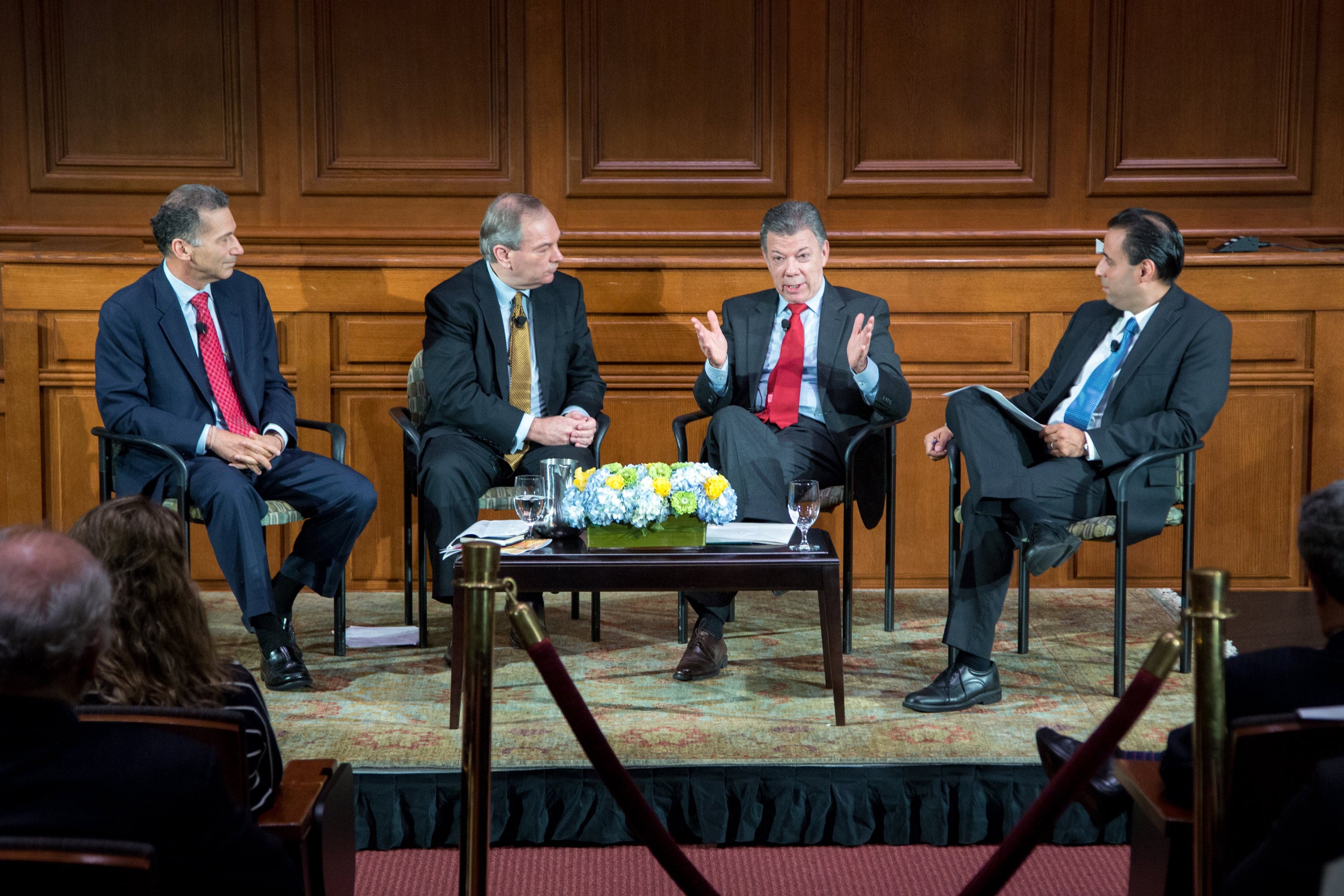Colombian President Juan Manuel Santos came to Harvard Law School on Sept. 20, to receive the “Great Negotiator Award,” an honor bestowed by the Program on Negotiation to recognize individuals whose “lifetime achievements in the field of negotiation and dispute resolution have had a significant and lasting impact.”
Last year, the Colombian president received the Nobel Peace Prize. Both awards recognize his work to end his country’s 52-year civil war and forge a comprehensive peace agreement between the Colombian government and the Revolutionary Armed Forces of Colombia (FARC). The conflict in Colombia has claimed more than 220,000 lives and displaced more than 6 million people.
It was a homecoming for Santos, who earned a mid-career/master’s in public administration from Harvard Kennedy School in 1981. A former journalist, he was also a Nieman Fellow in 1988. While at Harvard, he studied negotiation with Harvard Law professor Roger Fisher, co-founder of the Program on Negotiation and the Harvard Negotiation Project. This time, however, it was Santos who was the professor, guiding Harvard faculty and students through the intricacies of the six-year negotiation. Some of the tactics were traditional negotiation strategies. Others were implemented for the first time, such as making living victims central to the negotiation process during an armed conflict and placing a special focus on women.
“I was convinced this war had to end at the negotiating table, otherwise it could last 20, 30, or 40 more years,” said Santos. With mountains and jungles and money from drug trafficking and illegal mining, “Colombia is the ideal country for guerrilla warfare,” he said.
Santos was elected president of Colombia in 2010 after serving as defense minister under his predecessor, Alvaro Uribe, overseeing a strong military offensive against FARC. He knew adopting the posture of a negotiator would surprise the people who had elected him. “I was warned people would not understand. I was a war hero, a hawk,” he said. “But it was the only way to bring peace … If you only think about your popularity rate you will never take high enough risks to make a difference.”
Santos oversaw a team of negotiators who met with FARC leadership in Havana. The first year and a half of negotiations were conducted in secret. Both sides were highly skeptical about the possibility of success and used the time to build trust. In the meantime, the two sides remained at war – as they would throughout the negotiations.
Santos took discreet measures to build the trust of FARC, including authorizing the Colombian military and policy to take a more humanitarian approach and provide medical treatment to FARC’s war-wounded. “The only way for the military to gain legitimacy was by respecting the population, but also your enemy,” he said.
The government and FARC negotiated in five main categories: rural development; political participation, drugs, victims, and a laying down of arms.
To aid negotiations, Santos built relationships with neighboring countries, including Venezuela. And he engaged facilitators from four countries: Cuba and Venezuela – chosen by FARC – and Chile and Norway. He also had four main advisors, one of whom was Bill Ury, a distinguished senior fellow at the Harvard Negotiation Project. Ury was a panelist at HLS on Sept. 20, along with Harvard Business School Professors James Sebenius and Deepak Malhotra.
Sebenius observed that Santos’s negotiation gave unprecedented attention to living victims, making reparations, justice, truth, and non-repetition of the harms they had suffered. Ury called the victim-centered process a key innovation of the Colombian peace negotiation. Santos said many believed that victims would not accept giving any benefits to the perpetrators of crimes against them. However, victims insisted the negotiations continue because they didn’t want to see others suffer as they had, Santos said.
It is a dilemma where to draw the line between peace and justice, Santos said. “I had no moral doubt that you need to sacrifice justice in order to achieve peace…A peace agreement is imperfect by definition. I had to close down the factory of victims.”
The two sides reached an agreement in 2016. Santos put the agreement to a vote in a public referendum in October 2016. Though it was widely expected to win, it lost by a narrow margin, with 50.2 percent against and 49.8 percent in favor.
Santos pursued another round of negotiations to win over opponents, and a revised agreement with FARC was signed in November 2016. Both houses of Congress and the Constitutional Court approved it.
After HLS Professor Robert Mnookin presented the Great Negotiator Award to Santos at the end of his nearly three-hour conversation, Santos visited Widener Library to present a copy of the Colombian peace agreement to Harvard. Sarah Thomas, Vice President for the Harvard Library and University Librarian, accepted the award, telling Santos, “We are greatly honored. May it be a harbinger of peace to come around the world.”
